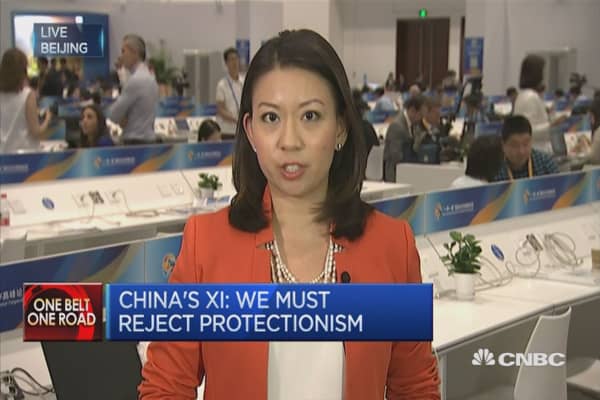China data sparks concerns of a consumer-led slowdown in world's second-largest economy
Benchmark equity indices in mainland China and Hong Kong closed higher on Monday as resurgent hopes for a significant public stimulus boost captured investors' attention more than did the release of a batch of poor activity and spending data.
Weakness was evident nearly across the board and continued a trend of disappointing news from the world's second-largest economy in recent months.
Industrial production expanded by an annual 6.5 percent in April, dropping from 7.6 percent in March and falling notably short of expectations while fixed investment data suggested a slowdown to 8.3 percent in April from 9.4 percent the previous month. Retail sales and fixed asset investment also underperformed forecasts.
"This slowdown as a result of weakening demand is also reflected in the prices of key industrial commodities like iron ore," said Sebastian Lewis, content director for Greater China at S&P Global Platts in an email to CNBC on Monday, pointing out that the price of iron ore had dropped 30 percent since February alone.
Partially offsetting the weakness, record steel output implied a positive read-through for construction while property development activity registered higher investment figures.

Tomohiro Ohsumi | Bloomberg | Getty Images
A Chinese flag flies in front of cranes at a construction site in the Fun City apartment complex, developed by China Vanke Co., in the Fangshan district of Beijing, China.
In sum, slowing domestic consumption growth and softer external demand appear to have driven the slowdown from the start of this quarter, said Julian Evans-Pritchard, China economist at Capital Economics, in a note to clients on Monday.
"For now at least, infrastructure and property investment are holding up, helping to stave off a sharper deceleration," Evans-Pritchard explained.
"But we doubt the current strength in these areas can be sustained given that policy is being tightened and the property market is starting to cool," he added ominously.
Chinese authorities have recently doubled down on efforts to rein in debt and prevent potential asset bubbles in areas such as property. Effects have been clearly seen in the short-term debt market where yields on five-year government bonds last week hit a two and a half year high, closing above those on 10-year bonds in a rarely seen example of yield curve inversion between the securities, as regulators focus on discouraging the use of borrowed money to buy government debt.
'New Silk road'
Yet recent credit data suggests such attempts have not been particularly successful to date, argued Emily Nicol, economist at Daiwa Capital Markets in a note on Monday.
"With credit data released Friday significantly stronger than expected despite the authorities' efforts to curb leverage, it remains to be seen whether the weakening in the indicators of new business in the April manufacturing and services sector surveys will indeed manifest themselves in an ongoing slowdown in activity over coming months," Nicol highlighted.
The data releases came against the backdrop of a summit in Beijing in honour of President Xi Jinping's "Belt and Road Initiative" which China's official news agency Xinhua describes as "a Chinese solution to global economic blues".
President Xi's pledge of $124 billion on Sunday to go towards expanding links along his hoped-for "new Silk road" between Asia, Africa and Europe, helped investors look past the flagging data indications to drive the Shanghai Composite to close 0.22 percent higher and the CSI 300 up 0.41 percent on Monday.
"We have very positive thinking on the Belt and Road initiative", Jyrki Katainen, vice-president of the European Commission, told CNBC at the conference on Monday.
"It aims to deepen economic ties and trade links between Europe and China and it focuses not only on infrastructure but also on wider issues. In our agenda, trade policy, especially investment agreements, is most important as it would strengthen connectivity between the European economy, European companies and China," he explained, adding data protection and infrastructure projects were also key elements of the strategy.
However, the proof of the initiative's success will be in the pudding, Katainen cautioned.
"Everything depends on the implementation."


No comments:
Post a Comment
Comments always welcome!